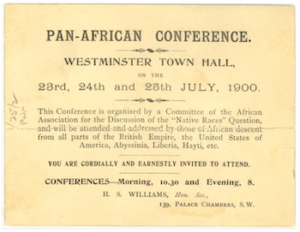
*On this date in 1900, the First Pan-African Conference began. This three-day event was in London just before the Paris Exhibition of 1900 "to allow tourists of African descent to attend both events.
On September 24, 1897, Henry Sylvester Williams played a pivotal role in responding to the European partition of Africa that followed the 1884 Berlin Conference. The formation of the association marked an early stage in the development of the anti-colonialist movement. It encouraged the unity of Africans and people of African descent, particularly in territories of the British Empire, concerning itself with injustices in Britain's African and Caribbean colonies.
It included Samuel Coleridge-Taylor, John Alcindor, Benito Sylvain, Dadabhai Naoroji, John Archer, Henry Francis Downing, and W. E. B. Du Bois took the chair with Bishop Alexander Walters of the AME Zion Church. Du Bois drafted a letter ("Address to the Nations of the World") to European leaders, appealing to them to struggle against racism, granting colonies in Africa and the West Indies the right to self-government, and demanding political and other rights for African Americans.
After the conference ended, Williams established branches of the Pan-African Association in Jamaica, Trinidad, and the USA. He also launched a short-lived journal, The Pan-African, in October 1901. Although plans for the association to meet every two years failed, the 1900 conference encouraged the development of more Pan-African Congresses.
Under the Pan-African Congress banner, a series of gatherings took place — in 1919 in Paris, 1921 in London, 1923 in London, 1927 in New York City, 1945 in Manchester, 1974 in Dar es Salaam, and 1994 in Kampala — to address the issues facing Africa because of European colonization. A centenary commemorative event was held in London on July 25, 2000, attended by descendants of some of the delegates at the original conference and descendants of delegates at the 1945 5th Pan-African Congress in Manchester.